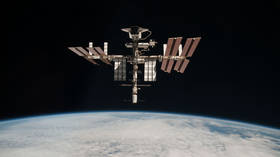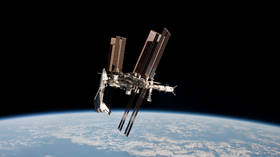Moscow to QUIT International Space Station in 2025 unless Washington lifts restrictive sanctions, says Russian space boss

Moscow will withdraw from the International Space Station project in 2025 if Washington continues to impose sanctions against the Russian space sector, with the country now making significant plans to explore space without the US.
That's according to Dmitry Rogozin, the head of the state space agency Roscosmos, who spoke on Monday to politicians about the frustrations of running the corporation while being sanctioned.
“The ball is in the court of our American partners. If sanctions against the Progress Rocket and Space Center and TsNIIMash remain in place, the issue of Russia's withdrawal from the ISS will be the responsibility of our American partners,” he said.
He went on to explain that sanctions must be lifted immediately; otherwise, Russia will refuse to work with the US and will deploy its own station in space.
Also on rt.com Moscow & Beijing send invitations to foreign space agencies to join Sino-Russian project to build a research station on moonThe ISS, which launched in 1998, is a joint project between NASA and Roscosmos, alongside JAXA (Japan), ESA (Europe), and CSA (Canada). Each expedition is dominated by astronauts and cosmonauts from the US and Russia.
However, despite Moscow's active participation in the ISS, the Kremlin has long floated the idea of ROSS, an orbital space satellite just for Russians. President Vladimir Putin signed off on plans earlier this year, and once complete, it will consist of three to seven modules and will be able to carry up to four people.
Last year, Vladimir Solovyov, the first deputy director of RSC Energia, the operator for the Russian segment of the ISS, explained that the current orbital satellite is falling apart, so a new alternative should be a priority.
“Until 2025, Russia has obligations to participate in the ISS program,” he said. “There are already several elements that have been seriously damaged and are out of service. Many of them are not replaceable. After 2025, we predict an avalanche-like failure of numerous elements on board the ISS.”
As things stand, Washington's sanctions against Moscow are causing serious problems for Russia's space program. According to Rogozin, Roscosmos is struggling to launch certain satellites due to the lack of one particular microchip that cannot be supplied due to economic measures.
“We have more than enough rockets, but we have nothing to launch,” Rogozin explained.
The US began imposing sanctions on Russia in March 2014, following the reabsorption of Crimea into Russia. Washington, like most of the Western world, considers it to be an illegal annexation. As part of the sanctions, Russia is banned from importing weapons and other defense-sector technologies from America.
However, despite Russia's apparent move away from space cooperation with the US, Moscow does not seem to want to go it alone in the cosmos. In March, Roscosmos signed a memorandum agreeing to create an international lunar research station with China's space agency, the China National Space Administration. According to the Russians, the moon base will be a “complex of experimental and research facilities.”
Like this story? Share it with a friend!














